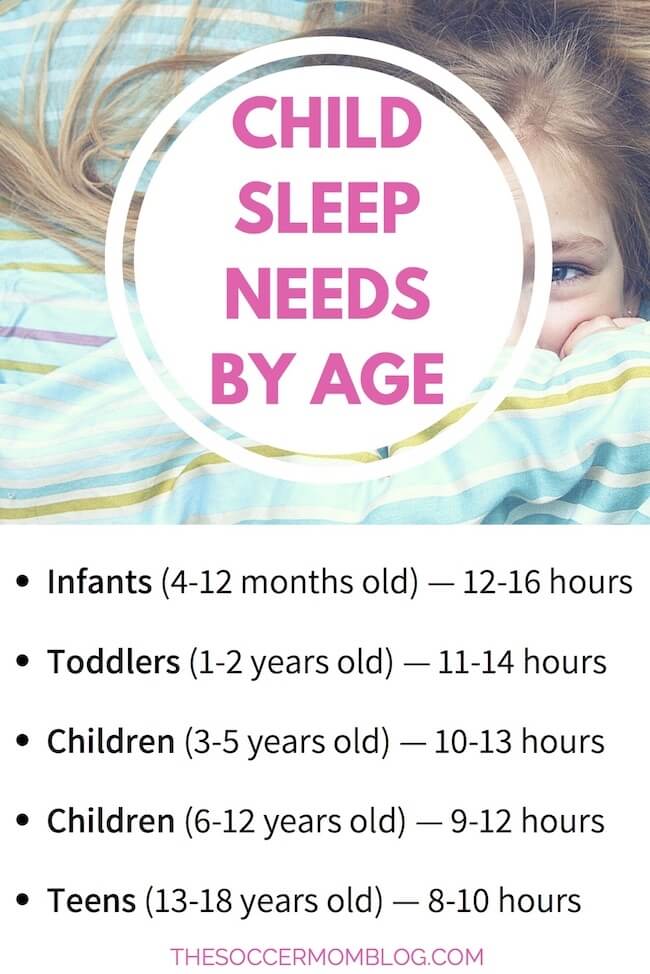Have you ever worried, “is my child sleeping too much?” We’ve got answers to your most common questions about child sleeping: many hours of sleep does a child need, how much deep sleep does a child need, plus a free printable child sleep chart!
Is My Child Sleeping Too Much?
Our middle daughter wakes up at the same time every morning — no matter what time we put her to bed. It’s as if she has an internal alarm clock!
Even when our toddler didn’t sleep through the night, she still woke up bright and early the next morning.
8:00pm bedtime? 8:30am wakeup.
11:00pm bedtime? 8:30am wakeup.
Of course her wakeup time may vary a few minutes here and there, but generally, it is the same time every single day. Plus, she wakes up rested, cheerful, and ready to start the day.
I’ll admit that we have tried later bedtimes on the weekends in hopes of getting to sleep in, with no luck.
As the sun begins its ascent above the horizon, our littlest family member is ready to start her day too!
Our oldest daughter is the exact opposite. She has always slept as long as we will allow her. On non-school days, that can be up to fourteen hours!
I sometimes find myself waking up my oldest daughter on weekends because I worry that my child is sleeping too much!
My oldest daughter is always fully awake and alert once she’s had a chance to eat breakfast, and she doesn’t fall asleep in school or places she shouldn’t. Yet there was still a nagging thought in the back of my mind, “Is my child sleeping too much? Is everything ok?”
If you also have had similar questions, like “how many hours of sleep does a child need?” or wondered if your child is sleeping too much, keep reading. We’ll break down the current recommendations for child sleeping, plus there’s a FREE printable child sleep chart!
Free Child Sleep Chart
If you’ve ever wondered how many hours should a child sleep, we’ve created a handy printable child sleep chart with current child sleeping recommendations.
The American Academy of Sleep Medicine and the American Academy of Pediatrics offer these guidelines for total hours of sleep needed in a 24-hour period:
- Infants (4-12 months old) — 12-16 hours of sleep
- Toddlers (1-2 years old) — 11-14 hours of sleep
- Children (3-5 years old) — 10-13 hours of sleep
- Children (6-12 years old) — 9-12 hours of sleep
- Teens (13-18 years old) — 8-10 hours of sleep
You can grab a printable copy of our child sleep chart here:
How many hours of deep sleep should a child get?
Like adults, how much deep sleep should a child get depends on the total amount of sleep per night. The goal is 20% of child sleeping time spent in the deep sleep stage.
Even within these expert child sleeping recommendations, there is a fairly wide range of what is considered “normal.”
For example, including her afternoon nap, my middle daughter falls squarely within the “normal” range. My older daughter also is in the normal range, though at the upper end.
Why would my oldest daughter need more sleep than my youngest?
Why Some Kids Need More Sleep Than Others
Is it possible that some kids need more sleep than others?
The answer is yes.
Here are a few common reasons why:
1. Not getting enough sleep during the week
Long school days, a heavy homework load, extracurricular activities, and parent work schedules often mean that kids don’t always get to bed early enough to meet their ideal sleep needs. This might cause children to sleep more on weekends, essentially to “catch up.”
Some researchers say that it is possible to make up for not getting enough sleep during the week by sleeping longer on weekends.
Say your child has to wake up an hour earlier than they naturally would on school days. These 5 “lost” hours might be made up by sleeping a couple hours longer on both Saturday and Sunday.
2. Anxiety or Stress
It’s well known that stress can cause problems with sleep, making it more difficult to fall asleep and/or stay asleep at night. However, for some people, anxiety can actually make them sleep more.
According to Dr. Rebecca Spencer, a professor at the University of Massachusetts Department of Psychology, “you can be driven to sleep simply by having a lot of emotional memories to process.” In short, when life gets overwhelming, your brain needs the ability to decompress and sort through what’s going on. It can’t do so properly unless you’re fully at rest.
Be cognizant of situations that could be causing stress for your child. Some might be obvious (a new sibling), while others might not be so simple to determine, like if your child is being bullied but hasn’t told anyone.
Click here for tips on how to deal with child sleep anxiety and help your child get more sleep.
3. It’s genetic – Some people just need more sleep!
How do I know? Because I am one of them!
My husband can function well on very little sleep. Sometimes he goes about his day on five hours of sleep! (This can be due to his work schedule OR due to his love of horror movies that none of us will watch with him during the day).
I am not my best self if I’ve gotten less than eight hours of sleep, and if I could, I would sleep much longer. I’ve always been like this — I just need more sleep than my husband.
There is actually a term for people who are genetically-wired to require more sleep than others, even more than what might be considered normal.
“Long Sleepers” often need ten hours of sleep or more (adults), and there’s not really anything that can be done to change that. We simply have to accommodate this as much as possible.
Therefore, the answer to the question “how many hours does a child need to sleep” may be different for each child.
What can you do if you think your kids need more sleep?
If you’re wondering how many hours of sleep should a child get and if your child is getting enough sleep, here are proven tips to help them get more shut-eye:
1. Help them fall asleep faster
These tips to help an anxious child sleep can be beneficial for any child who struggles to fall asleep. The less time spent trying to sleep means more actual rest.
2. Re-evaluate weekday activities
Is karate class really worth it if it means your child doesn’t get home for dinner until 7:30pm? When possible, find activities that can be done on weekends or earlier in the day.
3. Discuss a reasonable homework load with your child’s teacher
Even when my daughter is fully focused, it usually takes at least thirty minutes to complete her daily homework assignments. On days where she is especially tired from school, homework can drag over an hour as she struggles to retain focus.
The National Education Association recommends 10-20 minutes of homework for first graders, increasing by 10 minutes per grade. A recent study published by the American Journal of Family Therapy found that the average first grader actually receives three times the recommended amount of homework!
If you feel that excessive homework could be contributing to sleep issues, try talking with your child’s teacher to figure out a reasonable work load.
4. Try an Earlier Bedtime
Going to bed early may have benefits for kids’ health, and it will allow them more time to get the sleep they need. Alison at Pint-Sized Treasures explains why her kids have early bedtimes here.
When to see a doctor
Changes in sleep patterns, trouble staying awake during the day, or suddenly sleeping hours longer than usual could be signs of an underlying issue.
Trust your gut!
If something seems “off,” don’t ignore it. It can’t hurt to give your family physician a call.
Do you have any child sleep tips? Share them in the comments below!
Disclaimer: This post is based on my own experience and is not intended to be medical advice.
More of our favorite posts about child sleeping:
This One Thing Could be Why Your Toddler Still Wakes up at Night
Child Sleep Anxiety: 6 Tips to Help Your Child Get More Sleep
- Amish Sugar Cookies - April 19, 2024
- Marshmallow Playdough - April 18, 2024
- Homemade Fruit Leather Recipe - April 17, 2024






Leave a Reply